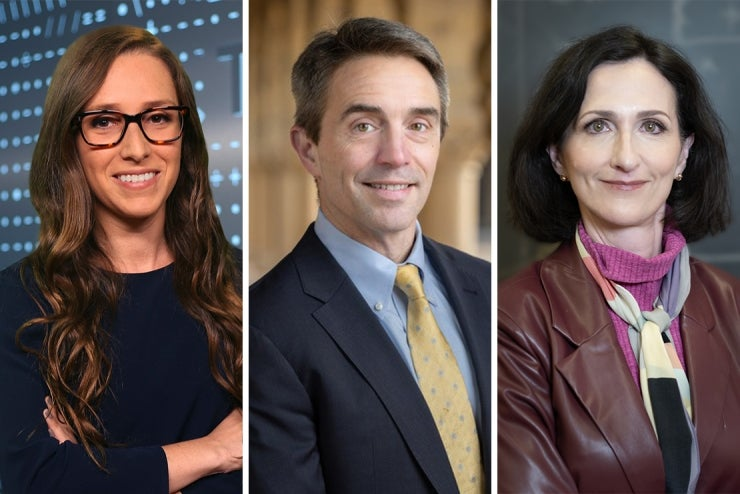In a "big win for Canada," the University of Toronto is further strengthening its academic ranks with three top researchers from U.S. universities whose work ranges from the search for new planets to the economics of powering our own.
The acclaimed new faculty members are astrophysicist and U of T alum Sara Seager, innovation and energy economics scholar Jacquelyn Pless and economics expert Mark Duggan, who will head the Munk School of Global Affairs & Public Policy.

From left: Jacquelyn Pless, Mark Duggan and Sara Seager will join U of T for the start of the 2026-27 academic year (photos supplied)
All three will join U of T for the start of the 2026-27 academic year.
U of T President Melanie Woodin said the university is intensifying its efforts to recruit the world's leading faculty - part of its broader strategy to advance its world-class research and scholarship - and there will be more announcements in the months to come.
"At a time when the value of scientific inquiry is contested and the importance of scholarly expertise questioned, the University of Toronto is a place where great minds still have the freedom to go where their curiosity takes them," said U of T President Melanie Woodin.
"Our world is facing big problems, but U of T can make a big difference in finding solutions - and we need the brightest minds of our time, from across Canada and around the world, to help us meet this moment.
"This is a big win for Canada."
U of T's global talent strategy aligns with its broader vision to support research excellence at all stages, including the recent launch of an emergency research fund to assist U of T faculty who were impacted by new restrictions on U.S. funding streams for international partnerships and a program to attract 100 more postdoctoral researchers from around the world.
While the university has been pursuing its strategy independently, the initiative is in step with broader national priorities, as reflected by Canada's recent $1.7-billion commitment in last week's federal budget to attract top global research talent.
For Seager, a dual citizen of Canada and the U.S., and a world-renowned expert on the discovery and characterization of exoplanets at the Massachusetts Institute of Technology (MIT), the opportunity to return to U of T as North Star Distinguished Professor at the Canadian Institute for Theoretical Astrophysics (CITA) represents a full-circle moment.
She grew up a few blocks from the St. George campus, where she later earned a bachelor of science degree in mathematics and physics.
"I'm excited to return home as a faculty member, researcher and mentor at the institution where my academic journey began - and to push the boundaries of discovery with forward-thinking collaborators across disciplines," said Seager, who will hold cross-appointments at the departments of physics and chemistry and the David A. Dunlap department of astronomy and astrophysics in the Faculty of Arts & Science, with funding from the Dunlap Institute for Astronomy & Astrophysics.
A U of T honorary degree recipient in 2023, Seager says she plans to establish an interdisciplinary research program that will rethink the habitability of planets and accelerate the search for life across the cosmos, drawing on fields ranging from astronomy and aerospace engineering to organic chemistry and computational physics.
She will also continue to lead a series of publicly and privately funded missions to Venus.
"U of T has consistently led the way in transformative research," said Seager. "I'm deeply honoured to join this community of visionary thinkers dedicated to innovation and impact."
Pless, meanwhile, is similarly joining U of T from MIT.
As an assistant professor of strategic management at the Rotman School of Management, she said she is looking forward to exploring topics at the intersection of innovation economics and energy markets in Canada given the essential role of energy in the country's economy.
"I'm especially interested in how public policy and market forces can accelerate innovation in clean energy and climate change mitigation technologies," said Pless.
She added that Toronto's status as a global tech, finance and policy hub makes U of T "the perfect place to study how innovation can help solve major societal challenges like climate change." The Rotman School's strong ties to industry, public policy and entrepreneurship make it "an ideal home for my work on the drivers and consequences of innovation for social progress," she added.
Pless said she's particularly excited to join a large public university with a broad and diverse student body. "I went to public schools and was a first-generation college student, so I care deeply about making education and research accessible," she said. "Being at U of T means reaching an even wider community of students who are passionate about making a difference - and I'm eager to contribute to that mission."
Duggan, for his part, is joining U of T's Faculty of Arts & Science as a professor and Munk Director of the Munk School of Global Affairs & Public Policy - an appointment supported by the Peter and Melanie Munk Charitable Foundation, whose longstanding generosity has had a transformational impact at the Munk School.
University Professor Janice Stein will remain interim director until the 2026-27 academic year.
Currently at Stanford University, Duggan said U of T offers an opportunity to apply his research expertise - which has ranged from health care and homelessness to retirement benefits and defence procurement - to Canada at a time when it is grappling with challenges that include housing affordability, slowing productivity, a reorientation of global trade relationships and strained health-care systems.
"I sincerely believe that research can help federal, provincial and local policymakers make more evidence-based decisions about how to improve the health-care system, tax code and much more so that Toronto, Ontario and all of Canada can get on a better trajectory," said Duggan, who will hold a secondary appointment in the department of economics in the Faculty of Arts & Science.
"In my new role, I will do my best each day to support the Munk School's faculty, students, staff and alumni in achieving their goals and having a positive impact on the world."
Duggan added that he's keen to bring together varied academic, business and policy communities to encourage dialogue - and looks forward to working closely with U of T faculty "who are helping to advance our understanding of an incredibly broad set of issues here in Canada and throughout the world."
The three new faculty appointments build on a growing roster of researchers recruited from the U.S. and elsewhere in recent years. They include historians Timothy Snyder and Marci Shore; philosopher Jason Stanley; and quantum chemist Alán Aspuru-Guzik, who is director of the Acceleration Consortium - an institutional strategic initiative that uses artificial intelligence and robotics to speed the discovery of new materials with self-driving labs.
Read more at the Munk School of Global Affairs & Public Policy
Read more at the Rotman School of Management
Read more at the Canadian Institute for Theoretical Astrophysics













